Share
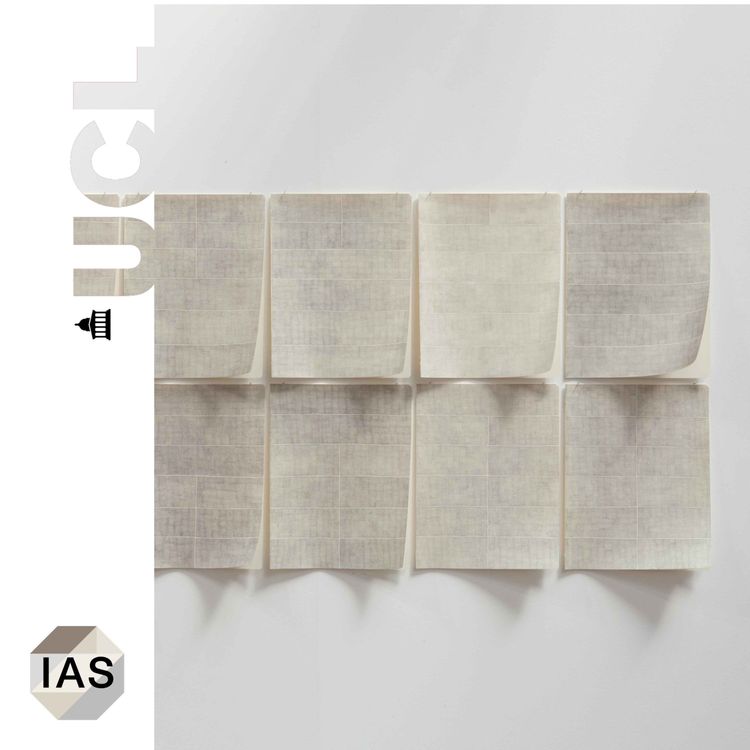
Think Pieces Podcast
Speculation
The UK Health minister and businesses say that the media speculates, and this affects their speculations. Countries speculate against each other’s speculations. Timescales, vaccines, movements, land, ecological and human alliances, salaries, taxes... everything seems more prone to speculation than ever in the uncertainty of what we tend to refer to as the ‘new’ normal. We can render speculation in terms of social benefit — thinkable futures and catastrophe warnings — or social degradation — conspiracy theories, capital investments and pressures to medical progress. In terms of certainty: from opening multiple possibilities and connections such as in science fiction, art practices or speculative music; to closing down a future for the many such as in capitalist logics. Or in terms of subject-object identification through speculative realism, materialism, psychology and physics. Is speculation a useful term to think about our current times? And can multiple forms of speculation and their conflation help us understand our way into the new normal and our material and psychological circumstances?
Speakers: André M. Carrington (UC Riverside), Aris Komporozos-Athanasiou (SRI, UCL), Ming Tsao (composer) and Marina Vishmidt (Goldsmiths).
Music by Afrikan Sciences, Ming Tsao, Active Denial System and Shō.
Image: Heide Hinrichs, Atemwende (Breathturn) (2018), series of 12 drawings, 27,9 x 21,4 cm, pencil on paper.
Sound effects are by the BBC Sound Archive
Producer, Editor and Host: Albert Brenchat-Aguilar
Executive Producer and Host: Nicola Miller (IAS Director)
More episodes
View all episodes
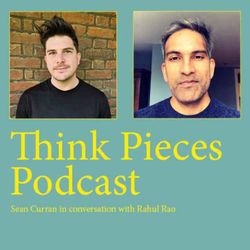
The Lives of Statues: Adored, Ignored, Abhorred?
25:47|The UCL Gender and Feminism Research Network (GFRN) and qUCL present a conversation with Rahul Rao, Reader in International Political Thought at the University of St Andrews, and inclusive heritage specialist Sean Curran.On 14 May 2024, Rao gave the GFRN and qUCL joint annual lecture titled 'The Libidinal Lives of Statues'. In this episode, Rao and Curran expand on the central question of the lecture: what is it about statues that has spooked people in the past enough to arouse in them the impulse to destroy.Standing in front of the Gandhi statue in Tavistock Square, Bloomsbury, London they reflect on why statues have become the ground on which struggles around caste and race are played out and why Gandhi statues in particular have become objects of contestation despite the common association of Gandhi as an anti-colonial figure. They move on to talk about statues as gifts from one country to another and whether it is violence to damage, deface or removing a statue. Above the whole conversation lingers the question: what is the future of statues - have they become obsolete?****Rahul Rao is Reader in International Political Thought in the School of International Relations at the University of St Andrews and the author of Out of Time: The Queer Politics of Postcoloniality (2020) and Third World Protest: Between Home and the World (2010). He is currently writing a book about statues.Sean Curran is an inclusive heritage specialist with 17 years of experience working in historic houses, libraries, archives and museums. Their PhD at UCL Institute of Education was about LGBTQ+ heritage, and they curated the first ever LGBT History Month exhibition at a National Trust property.Rao and Curran are introduced by Alex Hyde, Associate Professor in Gender Studies and Co-Director of the Gender and Feminism Research Network at UCL.The episode was produced by Marthe Lisson, Editor of Think Pieces.
2. Books on Indigenous Ecologies
42:37||Ep. 2In this second episode on Indigenous Ecologies, IAS postdoctoral fellows Olivia Arigho-Stiles and Adriana Suarez Delucchi are in conversation with Nayanika Mathur, Professor of Anthropology and South Asian Studies at Wolfson College, Oxford University.Mathur's research is interested in the anthropology of politics, development, environment, law, human-animal studies, and research methods. She is the author of Paper Tiger: Law Bureaucracy and the Developmental State in Himalayan India, which addresses everyday bureaucratic life on the Himalayan borderland.Her second book, Crooked Cats: Beastly Encounters in the Anthropocene (University of Chicago Press, 2021) is the starting point for this episode’s conversation. Arigho-Stiles, Suarez and Mathur embark on a discuss the term 'anthropocene', conservation practices and its bureaucratic challanges, including the impossibility of applying Western conservation practices to Indian species (and for that matter, non-Western natural environments more broadly). ******Olivia Arigho-Stiles and Adriana Suarez were postdoctoral research fellows at the Institute of Advanced Studies in 2023.Arigho-Stiles is an interdisciplinary researcher of Indigenous histories and the rural world in Bolivia, focussing on Bolivian Indigenous-campesino movements. She is a lecturer in Latin American studies at the University of Essex.Suarez Delucchi is a geographer working on natural resource management institutions at different scales in contested environments. Her work seeks to identify, address and challenge the marginalisation of rural and Indigenous groups from dominant management arrangements.Together, they co-edited a special issue of the IAS online review Think Pieces which you can read here: INDIGENOUS ECOLOGIES & ENVIRONMENTAL CRISIS - Think Pieces (thinkpieces-review.co.uk)The episode was produced by Marthe Lisson, editor of Think Pieces.
1. Books on Indigenous Ecologies
37:15||Ep. 1In this first episode on Indigenous Ecologies, IAS postdoctoral fellows Olivia Arigho-Stiles and Adriana Suarez Delucchi are in conversation with Indigenous K’iche’ Maya scholar and activist Emil’ Keme.Keme is professor in the English Department at Emory University, Atlanta. His teaching and research focus on contemporary Indigenous literatures and social movements, Central American-American literatures and cultures, and postcolonial and subaltern studies theory. He is a co-founding member of the binational Maya anti-colonial collective, Ix’balamquej Junajpu Wunaq’. He is also the author of the book Le Maya Q’atzij/Our Maya Word. Poetics of Resistance in Guatemala (2021) that is the starting point for this episode’s conversation. Arigho-Stiles, Suarez and Keme embark on a discussion about the relationship between poetry and resistance, the right to exist for Maya peoples and the struggle to keep their languages alive. They touch upon the idea of plurinationality and the ethos of translating.******Olivia Arigho-Stiles and Adriana Suarez were postdoctoral research fellows at the Institute of Advanced Studies in 2023. Arigho-Stiles is an interdisciplinary researcher of Indigenous histories and the rural world in Bolivia, focussing on Bolivian Indigenous-campesino movements. She is a lecturer in Latin American studies at the University of Essex.Suarez Delucchi is a geographer working on natural resource management institutions at different scales in contested environments. Her work seeks to identify, address and challenge the marginalisation of rural and Indigenous groups from dominant management arrangements. Together, they co-edited a special issue of the IAS online review Think Pieces which you can read here: INDIGENOUS ECOLOGIES & ENVIRONMENTAL CRISIS - Think Pieces (thinkpieces-review.co.uk)The episode was produced by Marthe Lisson, editor of Think Pieces.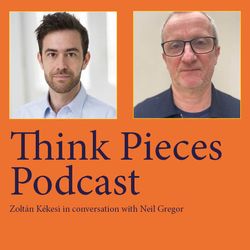
2. Sonic Legacies: Memory, Music, and the Third Reich
46:32||Ep. 2Zoltán Kékesi, cultural historian at the Centre for Collective Violence, Holocaust and Genocide Studies at University College London, is in conversation with Neil Gregor, Professor of Modern European History at Southampton University. They talk about the centrality of music in Nazi ideology and its “affective legacies”. How do the ways change in which different generations of listeners hear certain pieces of music that were composed and performed during the war? Have they changed at all and if so, what does it tell us?******Zoltán Kékesi's research evolves around “Final Account: Third Reich Testimonies”, a collection of interviews by British documentary filmmaker Luke Holland. Between 2008 and 2017, Holland interviewed German and Austrian, non-Jewish men and women who as children and adolescents had joined the Hitler Youth or League of German Girls. To trigger memories, he asked interviewees to sing songs of their childhood. Even when they refused to sing, songs took interviewees back in time and with the songs resurfaced experiences and personal stories of past times. His essay “A Pandora’s Box: The Horst Wessel Song in the Collection ‘Final Account: Third Reich Testimonies’” is available to read here: Musical memories – Compromised Identities? (compromised-identities.org).Neil Gregor has worked extensively on the cultural history of music in twentieth century Germany. His book, The Symphony Concert in Nazi Germany, is forthcoming with The University of Chicago Press. The episode was produced by Marthe Lisson, editor of Think Pieces, and supported by the Pears Foundation.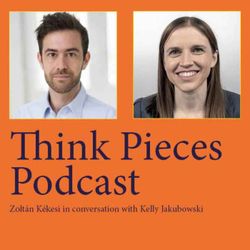
1. Sonic Legacies: Memory, Music, and the Third Reich
25:29||Ep. 1Zoltán Kékesi, cultural historian at the Centre for Collective Violence, Holocaust and Genocide Studies at University College London, is in conversation with Kelly Jakubowski, Associate Professor in Music Psychology at Durham University, to talk about the psychology of musical memories. They discuss how music shapes our memories, especially when music was experienced in the context of Nazi organisations and events. Why does music tend to evoke much more positive than negative emotions regardless of the emotion the music is expressing? And what is the ‘reminiscence bump’?******Zoltán Kékesi's research evolves around “Final Account: Third Reich Testimonies”, a collection of interviews by British documentary filmmaker Luke Holland. Between 2008 and 2017, Holland interviewed German and Austrian, non-Jewish men and women who as children and adolescents had joined the Hitler Youth or League of German Girls. To trigger memories, he asked interviewees to sing songs of their childhood. Even when they refused to sing, songs took interviewees back in time and with the songs resurfaced experiences and personal stories of past times. His essay “A Pandora’s Box: The Horst Wessel Song in the Collection ‘Final Account: Third Reich Testimonies’” is available to read here: Musical memories | Compromised Identities? (compromised-identities.org).Kelly Jakubowski’s research examines a range of topics within music psychology and empirical musicology, including memory for music, music-evoked autobiographical memory, musical imagery and imagination, earworms, absolute pitch, musical timing and movement, and cross-cultural music perception. She co-leads Durham’s Music and Science Lab, an interdisciplinary research group united by interests in empirical, computational, and biological approaches to understanding music listening and music making, and she is the Co-Director of Durham’s Centre for Research into Inner Experience. The episode was produced by Marthe Lisson, editor of Think Pieces, and supported by the Pears Foundation.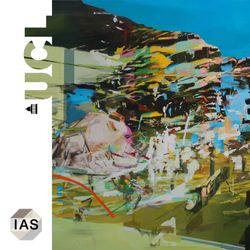
2. Concepts for the 'New Normal'. #2 Implication
42:16||Season 2, Ep. 2Welcome to this podcast on ‘Implication’.This new episode belongs to our series ‘Concepts for the New Normal’. The idea of these series is to bring together colleagues to explore a key concept of our times; offering a variety of perspectives from the Arts, Humanities and Social Sciences, on the ideas that are shaping our lives. Today’s concept is ‘implication’.How might we be implicated in structural problems like racism, the decline of democracy, social discrimination, modern slavery, and sexual violence? What are the background conditions that allow structural violence and injustice to take place? When and how does implication become significant? And how can we transform our implicated positions into collective solidarity work?By exploring the issue of implication in different contexts, the speakers in this podcast will address some of these questions. I am aware that there are many different forms and degrees of implication. This podcast does not aim to be comprehensive, but rather to open a conversation and invite all listeners to reflect on how they might be implicated in large-scale structures of violence and injustice. Speakers: Professor Michael Rothberg (UCLA), Dr Brian Klaas (UCL), Dr Jennifer Ferng (IAS / University of Sidney), Dr Maya Goodfellow (University of Sheffield) and Professor Alexis Shotwell (Carleton University). Music by Fuubutsishi, and Fingerspit. Artwork: Greet Van Autgaerden, Excursie #2 (2017) | 200 x 300 cm | oil on canvasSound effects are by the BBC Sound ArchiveProducer and Host: Dr Stefano Bellin (IAS/ University of Warwick)Co-Producer: Albert Brenchat-AguilarCo-Producer/Editor: Patricia Mascarell LlombartExecutive Producer and Host: Professor Nicola Miller (IAS Director)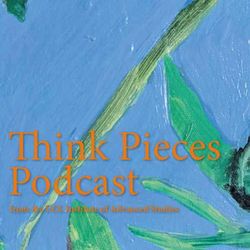
15. Tamar Garb in conversation with Lonnie G. Bunch III
38:50||Season 1, Ep. 15Welcome to the fifteenth podcast in our series ‘Life in the Time of Coronavirus’, with Lonnie G. Bunch III, Secretary of the Smithsonian.In conversation with Tamar Garb, Director of the IAS, Lonnie discusses the impact of the current conjunction of coronavirus and Black Lives Matter in the collections and public programmes of the Smithsonian; the specific role of the National Museum of African American History and Culture; the role that material culture plays in helping us to understand history; Lonnie's experience in South Africa and his approach to museums, reconciliation, reparation and truth telling. Finally, Lonnie explains the approach of the Smithsonian to the current crisis and the virtual space.Music by Smallhaus. Sound effects by the BBC Sound Archive. Speaker: Lonnie Bunch III (Smithsonian) and Tamar Garb (IAS, UCL)Produced and edited by Albert Brenchat-AguilarCommunications by Patricia Mascarell LlombartExecutive Producer: Tamar Garb
14. Arts and 'Familiar Alien Threats'
13:17||Season 1, Ep. 14Welcome to the fourteenth podcast in our series ‘Life in the Time of Coronavirus’. Here Ama de-Graft Aikins, British Academy Global Professor in the Institute of Advanced Studies at UCL, and a social psychologist researching chronic illness and experiences of care in African contexts, considers how artists are shaping current understandings of Covid-19 in Ghana. She situates contemporary responses to Coronavirus in relation to previous pandemics, specifically the Global Flu Pandemic of 1918 as well as the ongoing HIV crisis. Art, she argues provides a space of knowledge production, critical engagement and potential healing in the face of the threat to life and livelihood posed by the virus.Music by Smallhaus. Sound effects by the BBC Sound Archive. Speaker: Ama de-Graft Aikins(UCL)Produced and edited by Albert Brenchat-AguilarCommunications by Patricia Mascarell LlombartExecutive Producer: Tamar Garb